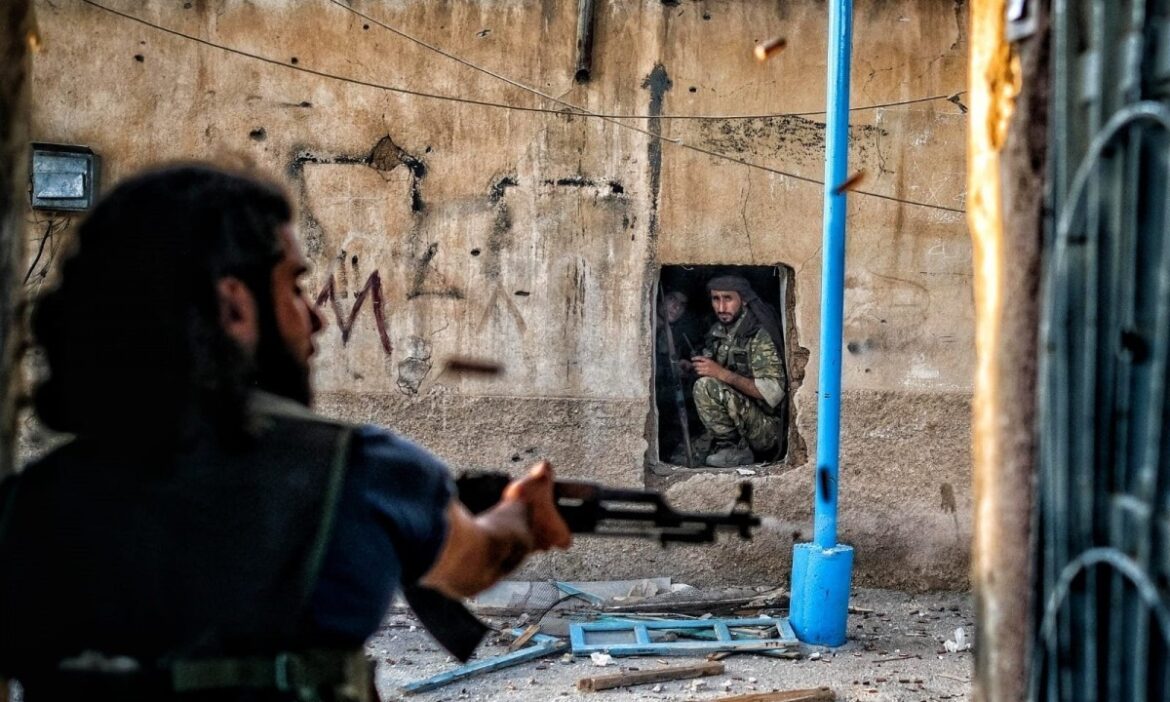-
Executive Summary
Over the first half of 2022, the Hevdesti-Synergy Association for the Victims in Northeast Syria documented 23 intra-factional clashes between factions of the opposition SNA in the regions of Ras al-Ayn/Serê Kaniyê and Tall Abyad that caused the death of one civilian and injured eight others, including a woman and a child. The internal fighting also killed 19 fighters of the Turkish-backed groups and injured at least 75.
During the same period, Hevdesti-Synergy Association documented four cases of murder carried out by anonymous gunmen in which two fighters of the opposition SNA as well as two civilians were killed. One of the civilians was a jeweler who was shot during a robbery. Moreover, Hevdesti-Synergy Association documented two failed assassination attempts in which three SNA fighters were injured. One single case of direct fire was documented when an armed group operating under the al-Hamza/al-Hamzat Division fired bullets on a gathering of civilians, injuring one boy.
The information collected by Hevdesti-Synergy Association showed that there are several reasons behind the internal clashing between the SNA-affiliated factions. The majority of clashes are on disputes over power, drug dealing, and human trafficking between Syria and Turkey. Other clashes take place at first between individuals and, in some cases, evolve to become a wider military confrontation. Tribal fanaticism (Asabiyya) contributes to developing some of the disputes between fighters of the SNA-affiliated into wider confrontations.
The biggest toll felt by intra-factional clashes between armed groups affiliated with the SNA over the first half of 2022 was in April, which coincided with the holy month of Ramadan, when eight internal clashes broke out. Seven broke out in March and four in May, one of which was the most violent internal clashes in Turkish-held areas in northern Syria.
The group that was part of the most intra-factional clashes in Ras al-Ayn/Serê Kaniyê and Tall Abyad regions during the period the report is covering is al-Hamzat Division, as it was involved in 16 cases of internal infighting. Tajammu Ahrar al-Sharqiya/Gathering of Free Men of the East took part in seven cases of internal infighting, the 20th Division took part in six, and the Military Police took part in five. The internal fighting did not break out, as expected, between two different armed factions only, rather eight internal clashes at least erupted between armed groups of the same faction.
All the intra-factional fighting between factions of the SNA in Ras al-Ayn/Serê Kaniyê and Tall Abyad regions broke out in populated areas such as markets, residential neighborhoods, and villages. In some cases, internal fighting broke out on checkpoints used by civilians. In addition, cases of killings, assassinations, and shootings were documented in the towns and villages.
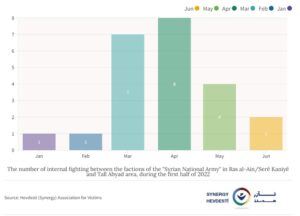
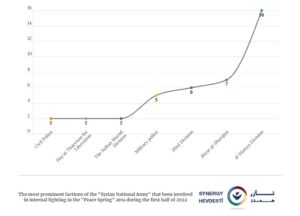
Based on the above, and contrary to Turkey’s propaganda that its military operation “Peace Spring” created a “safe zone”, armed chaos, and insecurity, and instability have continued to characterize the situation in the two regions of Ras al-Ayn/Serê Kaniyê and Tall Abyad, though two years and a half have passed since Turkey’s occupation of the two regions.
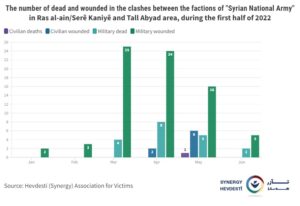
The victims believe that impacts of internal fighting and armed chaos are not only limited to civilian casualties and civilian property damages, rather they push the population to consider leaving the whole region. The deteriorating security situation increases the instability and clearly affects the economic development process, exacerbating the bad economic conditions and extreme poverty the majority of Syrians are already suffering from across the country.
Since October 2019, Turkey has occupied the areas lying between Ras al-Ayn/Serê Kaniyê and Tall Abyad and invaded them under the so-called “Operation Peace Spring”. Therefore, Turkey is under the obligation to ensure its respect to the duties of an occupying power, as spelled out primarily in Articles 42-56 of the 1907 Hague Regulations[1] and Articles 27-34 and 47-78 of the Fourth Geneva Convention, in addition to Common Article 2 to the Geneva Conventions regardless of the period of occupation and incremental obligations that take effect over time[2].
Beside not recognizing the occupation of parts of northeast Syria and not assuming its duties as an “occupying power” in the areas between Ras al-Ayn/Serê Kaniyê and Tall Abyad, widespread armed chaos and insecurity indicate that Turkey is violating items of the US-Turkish ceasefire agreement in northeast Syria, announced on 17 October 2019.
All of the above, the daily violations committed by armed groups of the Turkish-backed SNA, and lack of accountability and persistence of impunity, make the Turkish-held territories unsafe and not in meeting with the criteria of voluntary return and return set by the United Nations.
2. Recommendations
Turkey has failed to assume its responsibilities vis-à-vis the territories it occupies in Syria and has not taken any serious measures to ensure the protection of civilians. Instead, it has turned a blind eye to the intra-factional fights between the armed factions which were authorized to run the region by Turkey. Although the Turkish authorities control these areas effectively, they never intervened to stop the clashing or hold accountable fighters of the factions who were responsible for killing or injuring civilians, nor forcing a faction to compensate the material damages caused by internal fighting.
Based on the above, Hevdesti-Synergy Association recommends that:
- As an “occupying power”, the Turkish forces are under obligation to ensure public order and safety and afford special protection for women and children by taking all measures in its power to restore, and ensure, as far as possible, public order and safety in the occupied areas.
- The Turkish government is bound to the US-Turkish agreement, particularly the fourth and seventh articles which read that the two countries pledge to uphold human life, human rights, and the protection of the religious and ethnic communities, and to ensure safety and well-being of residents of all population centers controlled by Turkish forces.
- As a power effectively leading the opposition SYN, the Turkish government is obligated to do its best to safeguard the fundamental human rights in the areas it occupies by maintaining the law, holding accountable those who violate it, and protecting civilians from extortion, insecurity, and military action.
- The Syrian Interim Government (SIG)/opposition, and prior to that, the Turkish government as an occupying power, are under obligation to ensure the rights of all victims in the occupied areas to achieve justice by finding effective, clear, and easy-to-access remedies that ensure justice’s prompt and impartial achievement, hold accountable the perpetrators, and impose appropriate reparation procedures for the victims.
- Pursuant to rules of the International Humanitarian Law (IHL), armed groups of the SNA are obligated to avoid locating their headquarters and military sites inside cities or in the vicinity of civilians’ work or residence places. Leaders of these armed groups bear legal liability and the Turkish authorities in turn, as an “occupying power”, assume responsibility to ensure commitment to these rules.
3. Background
On 9 October 2019, the Turkish army started a military operation against northeast Syria. The Turkish president Recep Tayyip Erdoğan announced on Twitter the incursion of his country’s forces alongside groups of the Syrian armed opposition/the SNA into northeast Syria under the so-called “Operation Peace Spring” following the withdrawal of the US/the Global Coalition to Defeat Daesh/ISIS forces. In addition, Ankara obtained a green light to invade the region during a phone call between the Turkish president and former US president Donald Trump on 6 October 2019.[3]
The Turkish assault has had dangerous repercussions on the population in the region, specifically on civilians. The invasion caused the displacement of more than 180,000 people from Ras al-Ayn/Serê Kaniyê and Tall Abyad areas during its first days, including thousands of women and children. The displacement took place in quick uncoordinated waves, according to the United Nations[4].
On 17 October 2019, Turkey and the US reached an agreement to pause the Turkish offensive in northeast Syria for 120 hours and then Operation Peace Spring ended after the Syrian Democratic Forces/SDF completed its withdrawal from the region.
As a result of Operation Peace Spring that ended on 22 October 2019, Turkey and factions affiliated with the Turkish-backed SNA controlled a strip of territory on the border that is 120 km long and 30 km wide between the areas of Ras al-Ayn/Serê Kaniyê, northwest al-Hasakah city, and Tall Abyad in northern Raqqa. The operation also led to the displacement of more than 175,000 from the region, according to the Independent International Commission of Inquiry on the Syrian Arab Republic[5].
Following the end of Operation Peace Spring in the area lying between Ras al-Ayn/Serê Kaniyê and Tall Abyad regions, factions of the SNA divided the territories among themselves. The Levant Front/al-Jabha al-Shamiya, The Glory Corps/Faylaq al-Majd, and Tajammu Ahrar al-Sharqiya/ Free Men of the East took over Tall Abyad area while the Sultan Murad Division and al-Hamzat Division predominated in Ras al-Ayn/Serê Kaniyê. Other armed groups, including Army of Islam/Jaysh al-Islam, Faylaq al-Rahman/al-Rahman Legion, the Northern Hawks Brigade, The Mu’tasim Division, and the 20th Division, were also stationed in the area in smaller numbers.
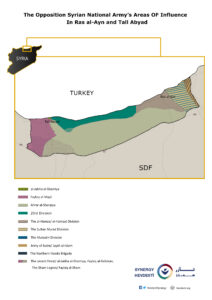
Despite reaching a US-Turkish “ceasefire” agreement and a Turkish-Russian “safe area” agreement on 22 October 2019, the Turkish-backed armed groups have committed many violations against the population in the region, varying from extrajudicial execution to arbitrary arrest and torture, as well as home seizure and denial of return. Moreover, the armed groups pillaged, looted, and seized public buildings and properties in the areas, including strategic grain storage which was sold in part to Turkey. Hevdesti-Synergy Association has published several reports documenting the violations committed by the armed groups in Ras al-Ayn/Serê Kaniyê and Tall Abyad regions.
Dozens of local and international parties have documented patterns of violations committed against residents in Peace Spring strip. Notably, the Independent International Commission of Inquiry on the Syrian Arab Republic documented countless violations to human rights and International Humanitarian Law (IHL) committed by armed groups of the SNA in a consistent pattern with what happened in Afrin in 2018.[6]
-
Civilians are Victims of Armed Chaos
Hevdesti-Synergy Association documented 23 intra-factional fights between armed groups of the opposition SNA in Ras al-Ayn/Serê Kaniyê and Tall Abyad regions over the first half of 2022. One civilian was killed and eight others were injured, including a woman and a child. Moreover 19 fighters of the armed groups were killed and at least 75 were injured.
During the same period, Hevdesti-Synergy Association documented four cases of murder carried out by anonymous gunmen where two fighters of the SNA, as well as two civilians, were killed. In another incident, two assassination attempts took place in which three SNA fighters were injured. One single case of direct fire was also documented when an armed group, operating under al-Hamzat Division, fired bullets directly on a gathering of civilians, injuring one boy.
Hevdesti-Synergy Association relied in its documentation process on the information collected in its database provided by a network of researchers scattered in the region and on accounts they obtained from the victims, their families, and eyewitnesses. Furthermore, it verified the information from publicly available sources (open sources).
Hevdesti-Synergy Association notes that victims of the internal factions between among groups of the SNA in Ras al-Ayn/Serê Kaniyê and Tall Abyad regions might be more than what have been mentioned, as the Association only publishes verified and documented cases.
A: Intra-factional Fighting Over Smuggling Routes
On 9 January 2022, an internal fight broke out in Ras al-Ayn/Serê Kaniyê city between fighters of al-Hamzat Division and the Military Police, which are affiliated with the SNA/opposition. The fighting concentrated in al-Kana’es and al- ‘Abra streets and in al-Mahta al-Shamali neighborhood. Machine guns were used.
The fighting lasted few hours, injuring one fighter of the al-Hamzat Division, according to a testimony by a lady from al-Mahta al-Shamali neighborhood. She narrated to Hevdesti-Synergy[7]Association:
“One fighter of al-Hamzat Division got a leg injury. I know about his injury since he stays in a house he has seized from a Kurdish family who fled following Operation Peace Spring, and I also live in the same street with my family. Days after his injury, his wife informed me that the fight was about stationing in a border point that is used for human trafficking and transporting people illegally to Turkey for money.”
B: Drug Dealing Causes an Internal Fight Between SNA Fighters
On 9 February 2022, another internal fight broke out between fighters of al-Hamzat Division and fighters of the Military Police on the one hand and between fighters of Sultan Murad Division and Tajammu Ahrar al-Sharqiya on the other hand in Ras al-Ayn/Serê Kaniyê city.
A member of the Civil Police, which was not a part of the internal clashes, told Hevdesti-Synergy Association that clashes broke out because of internal disputes over drug dealing in the region[8]. He continued saying:
“A patrol of the Military Police seized a few members of the Sultan Murad Division who were drugs dealers in partnership with other members of Tajammu Ahrar al-Sharqiya in al-Horana/Zorava neighborhood. When the Military Police attempted to arrest them, they fired at the patrol and injured one of the police officers who then retreated. After that, al-Hamzat Division intervened to support the Military Police given the clashes extended to the areas under its control near al-Kana’es street.”
The clashes lasted until late at night on that day and injured one member of the Military Police and two fighters from the Sultan Murad Division.
C: Shooting at Protesters, Among Them Women and Children
In March 2022, seven internal fights broke out between armed groups of the SNA, authorized by Turkey to run the area between Ras al-Ayn/Serê Kaniyê and Tall Abyad (Peace Spring territory). The internal fighting caused the death of four fighters and injured an additional 25.
In early March, an Iraqi national person was assassinated by two gunmen riding a motorcycle in the middle of Ras al-Ayn/Serê Kaniyê city. The security services of the SNA did not uncover identify of the killed person nor details of the crime. “Hevdesti-Synergy” Association documented that at least 55 Iraqi families of the Islamic State (IS) militants’ families reside in houses, owned by forcibly displaced persons, and were seized in the two neighborhoods of al-Horana/Zorava and Zaradasht in Ras al-Ayn/Serê Kaniyê city [9].
On 9 March 2022, an internal fight broke out between fighters of al-Hamzat Division on the one hand and fighters of Tajammu Ahrar al-Sharqiya and the 20th Division on the other hand in the village of Safah southern Ras al-Ayn/Serê Kaniyê. The fighting was over internal disputes on a military site. The armed clashing injured at least five fighters of the warring factions, according to a person from the village.
On 9 March 2022, an armed clash took place between displaced persons from Deir ez-Zor[10] countryside and fighters from al-Hamzat Division who assaulted a displaced person in the center of Ras al-Ayn/Ser Kaniyê. Rifles and RPGs were used in the fighting, spreading terror amongst the civilians. No casualties were documented.
On 10 March 2022, al-Hamzat Division and one of its brigades, known as Liwa Shuhada’a Badr, encircled fighters of the al-Qa’qa’ faction, which is also affiliated with the al-Hamzat Division, in the village of Mokhtalla west of Ras al-Ayn/Serê Kaniyê. Al-Qa’qa’ faction had announced its departure from the al-Hamzat Division and from Liwa Shuhada’a Badr due to reduction of military and logistical support provided to it. Residents from the village told Hevdesti-Synergy Association that within two days, fighters of al-Qa’qa’ faction were expelled from al-Hamzat Division and from the village as well.
On 13 March 2022, internal fighting broke out between al-Hamzat Division and Liwa Shuhada’a Badr on one hand and Tajammu Ahrar al-Sharqiya and the 20th Division on the other hand in the village of Tall Arqam west of Ras al-Ayn/Serê Kaniyê. At least five fighters of the clashing factions were injured. The internal fighting extended to reach al-Kana’es street in the center of Ras al-Ayn.
A field researcher with Hevdesti-Synergy Association reported that the internal fight was because of divisions within the ranks of the warring factions as a result of reducing military and logistic support provided by Turkey to some SNA-affiliated factions.
On 14 March 2022, Ibrahim Ismael al-Khedr[11], 10, was injured when members of al-Hamzat Division fired live bullets on protesters in the village of Tall Arqam. The protesters demanded the end of lootings and property seizure.
The boy was severely injured and was transported to the hospital according to a member of his family[12] who said that the villagers gathered to protest after fighters of al-Hamzat Division, operating under Hayat Thaeroon for Liberation, attempted to steal power cables from the village. The boy’s relative went on narrating:
“At the dawn of that day, fighters of al-Hamzat Division attempted to steal power cables from the village’s electricity transformer. But they fled away when they were discovered. then, tens of villagers, including women and children, gathered in front of a military point of al-Hamzat Division to protest the looting and property seizure. Fighters of the division fired live bullets on the protesters to disperse them and Ibrahim was injured.”
Ibrahim was transferred to the public hospital located in Ras al-Ayn/Serê Kaniyê until he got well, according to the eyewitness.
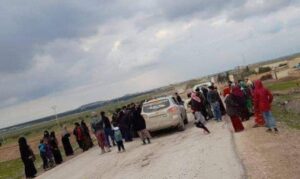
Image no (01)- showing residents of Tall Arqam village in the west countryside of Ras al-Ayn/Serê Kaniyê gathering around vehicles belong to al-Hamzat Division on 14 March 2022 protesting against the division’s fighters’ attempt to loot power cables from the village. Photo credit: local activists
On 21 March 2022, Nadim al-Zawan, a fighter of al-Hamzat Division, was killed when members of Liwa Shuhada’a Badr, which is affiliated to al-Hamzat Division, fired bullets on a checkpoint run by the division in the village of al-Aziziya west of Ras al-Ayn/Serê Kaniyê as a result of an internal fight between the two groups.
A person from the village who witnessed the clashing told Hevdesti-Synergy Association that there was a dispute over dividing power and royalty revenues collected from human trafficking and transporting people to Turkey[13] illegally.
The eyewitness continued saying:
“Clashing broke out between two groups affiliated with al-Hamzat Division, one is commanded by Abu Hamid al-Harbi and the other is commanded by Abu Iskander al-Deri affiliated with Liwa Shuhada’a Badr. The first group attempted to seize a checkpoint run by the latter in the village. The checkpoint imposes royalties on people wishing to cross to Turkey illegally as some armed groups of the SNA, specifically al-Hamzat Division, the 20th Division, and Tajammu Ahrar al-Sharqiya, transport people to Turkey for money.”
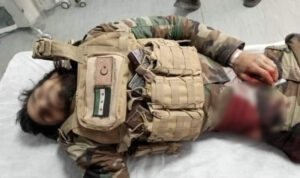
Image No (02)- showing the body of a fighter of al-Hamzat Division known as Nadim al-Zawan who was killed on 21 March 2022 as a result of internal fighting with Liwa Shuhada’a Badr in the village of al-Aziziya, west of Ras al-Ayn/Serê Kaniyê. photo credit: local Facebook accounts.
The day after, i.e., on 22 March 2022, internal clashes broke out between al-Hamzat Division on the one hand and some of its defected fighters, Tajammu Ahrar al-Sharqiya, and the 20th Division on the other hand near the town of Tell Halaf in the west of Ras al-Ayn/Serê Kaniyê and near Asfar and Najar Farm southern Ras al-Ayn. Machine guns and RPGs were used.
Hevdesti-Synergy Association’s field researcher followed up details of the internal fight and confirmed that it was over disagreements about dividing territories. The SNA-affiliated factions compete to benefit from revenues of smuggling food stuff into SDF-held areas/the Autonomous Administration as well as transportation of people to Turkey for money. Four fighters of the warring factions were injured.
Al-Hamzat Division took part in all the intra-factional fighting that broke out in Peace Spring territory over March 2022. The last internal clash the organization documented was on 30 March in Ras al-Ayn/Serê Kaniyê between al-Hamzat Division on one hand and the 20th Division on the other hand. Ahrar al-Qa’qa’/al-Qa’qa’ faction split from al-Hamzat Division and joined the 20th Division. Clashes with machine guns broke out in al-Kana’es street and the streets adjacent to it. Three fighters were killed and 11 others were injured from both sides.
The internal clashes took place between civilians’ houses and some of them fled temporarily to safer neighborhoods fearing death during clashes. One of the civilians identified as Qasim al-Sufi witnessed the first hours of the clashes and told Hevdesti-Synergy Association that armed men of al-Hamzat Division stole houses during the civilians’ temporary displacement.
As soon as the clashes ended, al-Hamzat Division started to storm civilians’ houses. About this, al-Sufi said[14]:
“As soon as the clashing ended, security officers of al-Hamzat Division started to storm and search houses in al-Kana’es street and the adjacent streets alleging that the people there were biased to the enemy faction. Three civilians were arrested on charges of leaking information to the 20th Division. None of the residents dared to object or even lodge a complaint because of the absence of accountability in the SNA-held areas.”
D: Turkey Turns a Blind Eye to the Intra-factional SNA Clashes
The biggest toll of intra-factional clashes between armed groups of the SNA was felt in April 2022, which coincided with the holy month of Ramadan. Eight clashes took place where eight people died and more than 26 were injured, including two civilians.
On 2 April 2022, residents of ‘Ajla village, western Ras al-Ayn/Serê Kaniyê, found the body of a man identified as Ali Abu Ibrahim, who was said to be an SNA fighter in Tall Abyad. Abu Ibrahim hailed from Suluk town in the north of Raqqa city. Hevdesti-Synergy Association is still verifying statements saying that Abu Ibrahim was killed by two leaders of the SNA-affiliated Military Police because he discovered that the two leaders were attempting to smuggle several IS militants to Turkey illegally.
On 7 April 2022, an internal clash broke out between al-Hamzat Division and the Malek Shah division in Tell Halaf town as a result of internal disagreements over dividing the profit of transporting people illegally to Turkey. None of the two sides declared any casualties.
On the same day, an internal fight broke out between two groups affiliated with The Mu’tasim Division in Ras al-Ayn/Serê Kaniyê, particularly in al-Horana/Zorava neighborhoods and al-Diwan Square. The fight was due to a dispute between leaders of the two groups over an occupied house that belong to one of the forcibly displaced people from the city. The clashes lasted for one hour and machine guns and rocket launchers were used. No casualties were reported.
Two days later, i.e., on 9 April 2022, an internal clash broke out between fighters of Liwa Shuhada’a Badr, which is affiliated with al-Hamzat Division, and fighters of the 20th Division in the village of Mokhtalla, west of Ras al-Ayn/Serê Kaniyê. The clashing was over power, human trafficking routes, and dividing profits collected from checkpoints that impose royalties on the local people.
According to a field researcher with Hevdesti-Synergy Association, the clash lasted until the next morning. Three fighters of Liwa Shuhada’a Badr and two of the 20th Division were injured.
Once again, disputes over dividing profits collected from transporting people illegally to Turkey has resulted in the killing of a fighter of al-Hamzat Division and the injury of another on 13 April 2022 when an internal fight broke out between two groups of the same division in the vicinity of Tell Arqam village in the west of Ras al-Ayn/Serê Kaniyê.
On the same day, i.e., 13 April 2022, an internal fight broke out among fighters of al-Hamzat Division near al-Kana’es street in the center of Ras al-Ayn/Serê Kaniyê. The fighting lasted only few hours as the Military Police intervened to stop it. No information was reported regarding the casualties.
On 20 April 2022, an internal clash broke out between fighters of Hayat Thaeroon for Liberation[15] and the Military Police in Ras al-Ayn/Serê Kaniyê. Security forces of Hayat Thaeroon for Liberation had arrested a member of the Military Police in Mabrouka town in the west of Ras al-Ayn.
Hevdesti-Synergy Association verified the participation of al-Hamzat Division’s fighters and others from the SNA, who are originally from the “Al-Akidat” tribe and since they are bound by virtue of tribal affiliation, in the fighting alongside the Military Police against Hayat Thaeroon for Liberation. The fight extended to other parts of the city and caused the death of one fighter of al-Hamzat Division and the injury of three others from both sides.
On 22 April 2022, a bloody internal fight broke out between members of the Civil Police and fighters of Hayat Thaeroon for Liberation in the city of Ras al-Ayn/Serê Kaniyê. Security officers of Hayat Thaeroon for Liberation arrested five members of the Civil Police who had attacked the brother of one of the security officers in his own shop after he refused to sell them on credit. The security officers cut the hair of three arrested members of the Civil Police and released the two others.
The clash killed six fighters on both sides, including Abul Karim al-Mawali, a commander in Hayat Thaeroon for Liberation, after he was critically injured. Additionally, 13 fighters from warring sides, and at least two civilians, were injured
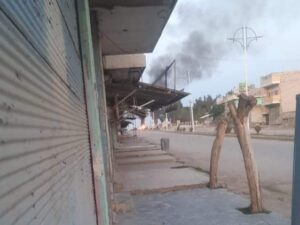
Image no (03)- showing the highway in Ras al-Ayn/Serê Kaniyê’s market empty of people on 22 April 2022 during the clash between members of the Civil Police and fighters of Hayat Thaeroon for Liberation. Photo credit: local activists
The clash created crossfire at the same time when Marwa Issa and her children were shopping to buy clothes for Eid. The gunfire spread terror in the market, which was packed with people during the last week of the holy month of Ramadan.
Issa, who is a Syrian displaced woman from Homs city and was transported by Turkish forces along with her family from Jarablus city to Ras al-Ayn/Serê Kaniyê following Operation Peace Spring, expressed her resentment to Hevdesti-Synergy Association about the armed chaos in the SNA-held areas. She said:[16]
“The armed clashes broke out near al-Barid Roundabout and Haj Wasfi shop complex, which are usually packed with shoppers. Then the clashes extended to the northern neighborhood of the city. Civilians were terrified, especially the women and children. A young man standing near us got a leg injury so we hid inside the shop complex until it was nearly time for iftar [the breaking of the fast] and the Turkish patrols intervened to disengage the clashes.”
According to Issa, the majority of the internal clashing among the SNA-affiliated factions take place nearby Turkish forces but they turn a blind eye to them. The reason why they intervened to stop the last clashes is illustrated by Issa as following:[17]
“The Turkish forces intervened only because the internal clashing coincided with the arrival of Abdullah Erin, governor of Turkey’s Şanlıurfa city, to Ras al-Ayn/Serê Kaniyê to attend a collective meal.”
“Hevdesti-Synergy” Association verified the visit of Abdullah Erin, governor of Şanlıurfa, to the Ras al-Ayn/Serê Kaniyê in the evening of 22 April 2022 simultaneously with the internal fighting between the Civil Police and Hayat Thaeroon for Liberation. In the early hours of morning, 23 April 2022, the governor posted on his Facebook account[18] a photo of him visiting Ras al-Ayn and meeting the Ras al-Ayn Local Council, affiliated with the affiliated with the Syrian Interim Government (SIG)/the opposition Syrian National Council (SNC), and joining a collective meal[19]. In turn, the Ras al-Ayn Local Council posted on its official Facebook account a photo showing the Turkish governor’s visit.
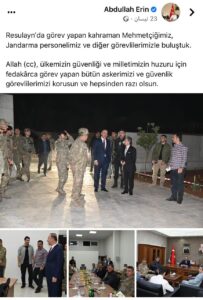
Image no (04)- showing the photos posted by Abdullah Erin, governor Turkey’s city of Şanlıurfa posted on the dawn of 23 April 2022. In the photos, he is talking about his visit to Ras al-Ayn/Serê Kaniyê. photo credit: Abdullah Erin’s official Facebook account
The last internal clash in Peace Spring territories during the holy month of Ramadan was on 26 April 2022. Fighters of two groups affiliated with the Eastern Army/Jaysh al-Sharqiya engaged in a fight against each other in Suluk town, that administratively follows Tall Abyad city northern Raqqa. The fight was over internal disputes about dividing revenues of smuggling fuel and food stuff between the SNA-held areas and the SDF-controlled ones.
The internal clashing stopped in the evening after iftar. Two fighters were injured and were transported to a hospital in Tall Abyad for treatment, according to a field researcher with Hevdesti-Synergy Association.
E: Absence of Effective Remedies to Victims in Peace Spring Territories
In May 2022, four intra-factional clashes broke out between armed groups affiliated with the SNA. One civilian was killed and at least six others were injured. Five fighters of the warring factions were also killed and 16 were injured.
On 4 May 2022, the third day of Eid al-Fitr, the civilian Thamer al-Tariha, from “Al-Shaitat” tribe in Deir ez-Zor countryside, was killed in a shooting between fighters of Tajammu Ahrar al-Sharqiya and other fighters of the Military Police in the village of al-Rawiya, in the west of Ras al-Ayn/Serê Kaniyê. The Military Police caught a human trafficking operation to Turkey by Tajammu Ahrar al-Sharqiya. The clash also killed a fighter of Tajammu Ahrar al-Sharqiya and injured another one for the Military Police.
A farmer who was near the scene and witnessed the death of the civilian narrated to Hevdesti-Synergy Association details of the incident.[20]
“Thamer was on his motorcycle waiting for someone when the shooting started out of the blue near him. He was shot with a few bullets and died on the spot although the shooting lasted less than half an hour.”
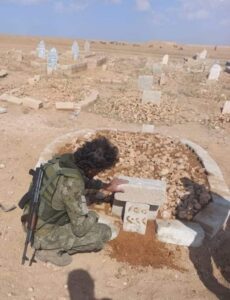
Image no (05)- showing a member from “Al-Shaitat” tribe in Deir ez-Zor, who is also a fighter of the SNA, sitting beside Thamer al-Tariha’s grave in Ras al-Ayn/Serê Kaniyê. Al-Tariha was killed on 4 May 2022 as internal fighting broke out between fighters of the Military Police and Tajammu Ahrar al-Sharqiya in al-Rawiya village. Photo credit: local activists
On 9 May 2022, an internal clash broke out between fighters of the Sultan Murad Division in al-Horana/Zorava neighborhood in Ras al-Ayn/Serê Kaniyê when a smuggling operation of narcotic pills was seized and because of disputes between the fighters over dividing smuggling profits. The clash lasted about one hour. One fighter was injured according to a field researcher with Hevdesti-Synergy Association.
On 14 May 2022, an SNA fighter, identified as Salih al- Muhammad, who hailed from al-Susah village in Deir ez-Zor countryside, was shot dead in the middle of Ras al-Ayn/Serê Kaniyê. The perpetrators are unknown.
The SNA disclosed no information concerning the incident. However, Munzer Ghali, a displaced man from Syria’s Homs who now lives in Ras al-Ayn/Serê Kaniyê, told Hevdesti-Synergy Association that the crime was committed near al-Diwan Square in the city center. He continued as saying:[21]
“As soon as Salih got out of his car, he was shot directly in the abdomen with two bullets from a vehicle (Hyundai Santa Fe). Salih died from his injuries.”
On 18 May 2022, sporadic internal fighting broke out and lasted for a whole day between fighters of the Military Police on the one hand and the Civil Police on the other hand in Ras al-Ayn/Serê Kaniyê on the road linking al-Barid Roundabout and al-Jozah/al-A’alaf Roundabout on Tell Halaf town road.
According to the information obtained and verified by Hevdesti-Synergy Association, one fighter of the Civil Police was killed and three others were injured. Two civilians were also injured, including Muhammed Naser al-Abdullah, who suffered serious injuries.
On 19 May 2022, a fighter of the Military Police was stabbed by anonymous persons in front of his own house located in Hammam al-Turkman village in Raqqa countryside. The fighter was transferred to the public hospital in Ras al-Ayn/Serê Kaniyê for treatment. The Military Police gave no information concerning the incident.
The most violent internal fighting in Ras al-Ayn/Serê Kaniyê over the first half of 2022 started in the early hours of 25 May. Gunmen from “Al-Akidat” tribe, who are also fighters with the SNA, attacked some of al-Hamzat Division-affiliated groups, whose members are from the “Al-Muwali” tribe. The fighting was because a commander known as Abu Homsi al-Muwali in Khalid al-Abdulla Division, affiliated with the al-Hamzat Division, had killed the young man Muhammad al- ‘Awad al-Da’ar, a fighter of the SNA and also a member from “Al-Akidat” tribe in the east countryside of Deir ez-Zor.
For revenge, as members of “Al-Akidat” tribe said in audio recordings published on groups on WhatsApp and Telegram, the tribe deployed all gunmen loyal to them in Ras al-Ayn/Serê Kaniyê and its countryside and launched a wide attack on headquarters run by groups affiliated with “Al-Muwali” tribe in the al-Hamzat Division primarily. Light and medium weapons were used by members of “Al-Akidat” tribe.
A video filmed on 25 May 2022, documented clashing between the two sides near Ibn Khaldoon high school in al-Mahta al-Shamali neighborhood. The video clearly shows the use of machine guns and RPGs among the residential neighborhoods.
Soon, gunmen from “Al-Akidat” tribe took over several neighborhoods in Ras al-Ayn/Serê Kaniyê city and some villages in the west and south countryside. A state of panic spread among the civilians, especially among women and children. Dozens of families temporarily fled the city and some of them were housed in al-Amin Hall for Weddings located on al-Hasakah highway south of Ras al-Ayn. At least four civilians, including a woman and a child, were injured during the clashing.
Another victim of the clashing was a Turkish woman, Kar Piyaz Dimir, 40, who lives in Turkey’s Ceylanpinar city, adjacent to Syria’s Ras al-Ayn/Serê Kaniyê. A stray bullet coming from the direction of Syria’s Ras al-Ayn hit her neck and she was moved to the state hospital in Ceylanpinar for treatment, according to Turkish media outlets.
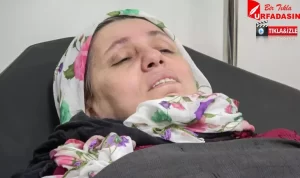
Image no (06)- showing the Turkish lady Kar Piyaz Dimir receiving treatment in the state hospital in Turkey’s Ceylanpinar city after she was injured with a stray bullet coming from the direction of Syria’s Ras al-Ayn/Serê Kaniyê on the Turkish border due to internal fighting between gunmen of “Al-Akidat” tribe and others of “Al-Muwali” tribe. photo credit: the Turkish website urfadasin
Additionally, Abdurrahman Kaji, a resident of Ras al-Ayn/Serê Kaniyê was injured with a shrapnel in the face. Gun machines and RPGs were used in the clashing. Huge material damage was inflicted to the residents’ houses and cars.
The clash killed three fighters and injured eight others of al-Hamzat Division, who are also members of “Al-Muwali” tribe. Three fighters of the SNA who are at the same time members of the “Al-Akidat” tribe were also injured.
A civilian whose house was damaged in the fighting told “Hevdesti-Synergy” Association that he lodged a complaint to the Military Police and to the Ras al-Ayn Local Council demanding repairs to his house. Instead, he was mocked. He narrated:[22]
“An artillery rocket hit my house in Zaradasht neighborhood during the last clashing. Thank goodness none of my family got hurt. After the clashing subsided, I filed a complaint to the Military Police and another one to the Ras al-Ayn Local Council against the warring factions. I demanded repairs to my house but they mocked me. One member of the Ras al-Ayn Local Council told me, taunting: ‘go home. It is good that you and your family are well’.”
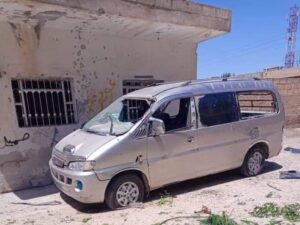
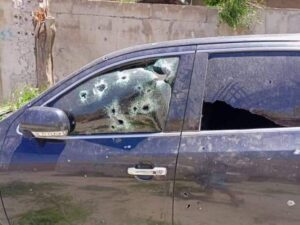
Image no (07) and (08)- showing some of the damage inflicted to residents’ houses and cars in Zaradasht neighborhood in Ras al-Ayn/Serê Kaniyê on 25 May 2022 as a result of internal fighting between gunmen of “Al-Akidat” tribe and others of “al-Muwali” tribe, who are fighters of the SNA in Ras al-Ayn. Photo credit: local activists
F: A Jeweler Killed at Midday During a Theft
In June 2022, two cases of internal clashes broke out in Ras al-Ayn/Serê Kaniyê. Two fighters of the warring factions were killed and five others were injured. In late June, a jeweler was killed by anonymous gunmen during a robbery.
On 15 June 2022, an internal fight broke out in Ras al-Ayn/Serê Kaniyê between fighters of Tajammu Ahrar al-Sharqiya and others from al-Hamzat Division. No information was received regarding the reason behind the fight nor the casualties. However, the next day, one member of the Civil Police and another one from al-Hamzat Division were shot and injured in the city. The perpetrators are unknown.
Two days later, i.e., on 18 June 2022, a severe internal clash broke out between Tajammu Ahrar al-Sharqiya on one hand and al-Hamzat Division and the 20th Division on the other hand in the village of Tal Dhiab in the west of Ras al-Ayn/Serê Kaniyê. The fighting was due to prolonged conflict between the two sides to seize a fuel station and a farm that belong to people who were forcibly displaced. Light and medium weapons and artillery rockets were used in the clash that caused a temporary displacement of civilians in the area. Two fighters were killed and three were critically injured. As a consequence, Al-Hamzat Division took over headquarters of Tajammu Ahrar al-Sharqiya.
On 30 June 2022, the jeweler Muhammad al-Barhawi, who belongs to the Chechen community, was killed when two masked gunmen riding a motorcycle shot him in front of his house in Ras al-Ayn/Serê Kaniyê. Recorded videos[23] from security surveillance cameras of al-Barhawi’s house show the masked gunmen stealing a bag from his hand.
The next day, dozens of people took to the street to bury al-Barhawi and protest against the state of insecurity and armed chaos which has spread throughout the region since Turkey occupied it and gave the opposition SNA-affiliated factions full control.
The protesters chanted “Peace Spring, no security” to indicate lack of safety in the “safe area”, demanding Turkey to police the area and hold violators accountable.
-
Insecurity in Peace Spring Territory
Turkey said its military operation against northeast Syria in October 2019 was to create a safe area to protect its national security and restore peace and security to the region. However, contrary to Turkey’s propaganda, the spread of arms, insecurity, and instability have characterized the situation in Ras al-Ayn/Serê Kaniyê and Tall Abyad regions, despite the fact that two years and a half have passed since its occupation.
Phenomena of Proliferation and use of weapons among the civilians, without any supervision or authorization, has spread widely in the Turkish-occupied areas in Ras al-Ayn/Serê Kaniyê and Tall Abyad. The Ministry of Defense of the SIG, the political umbrella of the SNA, issued a circular on 12 April 2022 to police the possession and use of arms in its areas of control and limit its use to training camps, confrontation zones and security points[24]. Yet arms are still widely spread. Normal disputes turn violent as arms are used, either with bullets fired in the air to frighten and intimidate, or else live fire with the intent to injure or kill.
-
Turkey’s Legal Responsibility as an “Occupying Power”
Since October 2019, Turkey has been exercising effective control over the area lying between Ras al-Ayn/Serê Kaniyê and Tall Abyad which it occupied after the so-called Operation “Peace Spring”. Turkey maintains a military presence there, imposes Turkish law, Turkish school curriculums, and other Turkish-state jobs. Therefore, Turkey is an “occupying power”.
Territory is considered “occupied” when it is comes under the effective control or authority of foreign armed forces, whether partially or entirely, without the consent of the domestic government. Today, an occupying power’s effective control can be exercised without a continuous military presence in the territory as the focus is on the extent of authority retained by the foreign focus rather than exclusively focusing on how it is exercised[25]. As soon as the territory is under the effective control of foreign armed forces, laws of occupation apply.
Turkey deals with these regions as if they were a part of Turkey. For example, the two occupied cities of Ras al-Ayn/Serê Kaniyê and Tall Abyad administratively, as well as in terms of services, follow Turkey’s governorate of Şanlıurfa. The Syrian Center for Support and Coordination, which is run by Şanlıurfa’s governor, provides public services, including water, garbage collection, city cleaning, heath care services, and humanitarian assistance. Şanlıurfa’s former governor Abdullah Erin, and his successor Salih Ayhan visited the occupied region several times to check the projects implemented. Turkish state departments coordinate these services with the support and aid provided from the Turkish armed forces.[26]
On the other hand, the Turkish armed forces still control these territories and have established military bases[27] and checkpoints there. The Turkish government provides training and logistical support to the SNA and police forces in the occupied area, and closely coordinates with them, at the highest levels, including instructing executive orders to senior commanders.
In the Turkish-occupied areas, Turkey bears responsibility to ensure public order and safety, especially protection for women and children. Turkey remains bound by applicable human rights obligations vis-à-vis all individuals present in these territories. If Turkish forces do not intervene to stop violations when they are informed about, they may be violating the aforementioned obligations.
Furthermore, the occupying power is under obligation to respect the provisions of the human rights treaties to which the country whose territory is partially or totally occupied is a party.[28] Moreover, the extraterritorial application of human rights conventions is an obligation incumbent on the occupying power. [29]
Since the occupying power “is under an obligation, according to Article 43 of the 1907 Hague Regulations, to take all the measures in its power to restore, and ensure, as far as possible, public order and safety in the occupied area.”[30] Turkey is obliged “to secure respect for the applicable rules of the [IHRL] and [IHL], to protect the inhabitants of the occupied territory against acts of violence, and not to tolerate such violence by any third party”. Therefore, the occupier must also respect its own obligations derived from its own commitments to any international or regional conventions, in addition to any customary provisions. This was confirmed by the European Convention of Human Rights (ECHR) which in turn stressed that the country part of the ECHR[31] is obliged to apply the Convention outside its national territory, to the benefit of foreign nationals, whenever it is exercising control or authority over a foreign individual, and whenever it is exercising effective control over a territory other than its national territory.[32]
-
Violation of the US-Turkish ceasefire agreement
Weapon chaos and insecurity in these areas indicate that Turkey is violating items of the US-Turkish ceasefire agreement signed for northeast Syria on 17 October 2022, which was also called a “historic agreement” by the US White House.
The agreement was announced by former US-Vice President Mike Pence and the Turkish President Recep Tayyip Erdoğan after negotiations in Ankara. Soon after, former US president Donald Trump praised the agreement, adding “millions of lives will be saved”. A joint US-Turkish statement following the negotiations said, “the Turkish armed forces will take over the creation of the safe area”.
Item No. (4) in the joint US-Turkish statement, that included 13 items, said “the two countries pledge to uphold human life, human rights and the protection of the religious and ethnic communities”. Also, item No. (7) of the agreement said, “Turkey voiced commitment to ensure safety and well-being of residents of all population centers in the safe area controlled by the Turkish forces, and reiterated that it will take utmost precautions to avoid inflicting damage on civilians or on infrastructure.”
Turkey failed, as an occupying power, to maintain the safety and security of the civilians living in the areas under its control. The numerous and continuous cases of intra-factional fighting between armed groups of the Turkish-backed SNA and proliferation and use of weapons among civilians all but ensure that the area lying between Ras al-Ayn/Serê Kaniyê and Tall Abya, which Turkey calls a “safe zone”, is not safe at all, and that civilians’ lives are at risk.
Not taking serious measures to maintain safety and security by the Turkish authorities effectively controlling these territories and turning a blind eye to the internal fighting among the armed groups tasked to administer the occupied region, violate Turkey’s obligation to uphold human life and human rights, contrary to item number four of the US-Turkish agreement. In addition to civilian’ casualties and material losses during these clashes, on more than one occasion, civilians were arrested by the warring factions on charges of dealing with the enemy faction. Furthermore, civilians were forced to flee, fearing death during clashes, and were subjected to home and property pillage.
1 The Regulations Respecting Laws and Customs of War on Land, the Hague, 18 October 1097
2 ICRC, ‘Occupation and other Forms of Administration. Expert Meeting’, March 2012, p. 18.
[3] Amy Austin Holmes: Syrian Yezidis Under Four Regimes: Assad, Erdogan, ISIS and the YPG, The Wilson Center’s Middle East Program, No. 37 l July 2020. P.12: g
[4] UNHCR: More than 10,000 Syrians crossed the Iraqi border since the onset of the Turkish campaign on northeast Syria, the United Nations, 25 October 2019. (Last accessed on 25 July 2022). https://news.un.org/en/story/2019/10/1042501
[5] The Independent International Commission of Inquiry on the Syrian Arab Republic, 28 January 2020, para 54, Document NO A/HRC/43/57.
[6] Previous source.
[7] The interview was conducted on 28 July 2022. Her name is withheld upon her request.
[8] Leaders of the armed groups of the SNA are accused of being involved in drug dealing in the Turkish-held areas in northern Syria.
[9] On 2 June 2022, the Turkish Humanitarian Relief Foundation (IHH) had moved 139 Iraqi families from Ras al-Ayn/Serê Kaniyê and Tall Abyad regions to Turkey in order to repatriate them to their own home country in coordination with the Iraqi consulate in Turkey’s Gaziantep city and the Iraqi Migrants and Expats Office based in Istanbul. 131 families out of them lived in Ras al-Ayn/Serê Kaniyê city. That was the second time the IHH moves Iraqi families from Peace Spring territory into Turkey. In September 2021, the IHH moved 57 Iraqi families to Turkey. For more information, please visit: A Turkish Organization Coordinates return of scores of Iraqi Families from Ras al-Ayn/Serê Kaniyê and Tall Abyad, al-Khabour, 2 June 2022. (last accessed 18 July 2022).
[10] Some of them are family members of the SNA fighters and others were forcibly deported from Turkey into Turkish-occupied territories, including Ras al-Ayn/Serê Kaniyê.
[11] Facebook accounts and local websites reported that the boy’s name was Mahmoud Ismael al-Khedr, but “Hevdesti-Synergy” Association verified the name and details of the incident.
[12] The interview was conducted on 15 March 2022. The witness’s personal information is withheld for security reasons.
[13] Al-Aziziya village, west of Ras al-Ayn/Serê Kaniyê, has been a point for smuggling people into Turkey illegally since Turkey occupied the region in Operation Peace Spring in October 2019. The SNA-affiliated factions, in particularly al-Hamzat Division, the 20th Division, and Tajammu Ahrar al-Sharqiya, use the village to collect money by imposing royalties on the people wishing to cross illegally to Turkey. Besides, they use it to smuggle food stuff from and to areas under the control of the Syrian Democratic Forces (SDF).
[14] The interview was conducted via the Internet on 18 July 2022. A pseudonym was used based on the witness’s willing.
[15] It is an alliance founded on 23 January 2022 as a result of integration of Thaeroon Movement, which is formed of nine factions of the SNA, most notably: The Sultan Murad Division and Suleiman Shah Brigade/al-Amshat, with the Syrian Liberation Front/SLF, which is formed of two factions: al-Hamzat Division and the Mu’tasim Division. The new formation known as Hayat Thaeroon for Liberation is commanded by Fahim Issa.
[16] The interview was conducted via the Internet on 15 July 2022. A pseudonym was used based on the witnesses’ willing.
[17] A video circulated on 22 April 2022 shows Turkish tanks and armored vehicles enter Ras al-Ayn/Serê Kaniyê to disengage the ongoing internal clashing between the warring factions affiliated to the SNA. (last accessed 27 July 2022).
[18]The Facebook account has got a blue tick and it was verified that it is really the official account of Abdullah Erin, former governor of Şanlıurfa city.
[19] The Turkish governor posted photo of the visit at 2:27 am on 23 April 2022. From the photo, it is clear that he crossed the border point in the evening of 22 April 2022.
[20] The interview was conducted via the Internet on 19 July 2022. The identity of the witness is withheld upon his request.
[21] The interview was conducted on 6 June 2022. Information about the eyewitness is withheld upon his request.
[22] The interview was conducted via a phone call on 30 May 2022. Identity of the witness is not revealed for his safety.
[23] Many local websites published them on social media. “Hevdesti-Synergy” Association keeps a copy in its online database.
[24] SIG’s Ministry of Defense issues circular to police the possession of weapons in areas it controls. Enab Baladi, 13 April 2022. (Last accessed 25 July 2022). https://www.enabbaladi.net/archives/564901.
[25] ICRC Commentary on GCII (2017), § 331.
[26] Turkey’s AFAD, Şanlıurfa governorate distribute aid in northern Syria, DAILY SABAH, 27 Nov 2020.
[27] Turkey restores water supply network for 35 Syrian villages, DAILY SABAH, 30 Dec 2020.
[28] UN Human Rights Committee (HRC), CCPR General Comment No. 26: Continuity of Obligations, 8 December 1997, CCPR/C/21/Rev.1/Add.8/Rev.1. §4.
[29] ICJ, Legal Consequences of the Construction of a Wall in the Occupied Palestinian Territory, Advisory Opinion, ICJ Reports 2004, p. 136, § 106.
[30] ICJ, Armed Activities on the Territory of the Congo (Democratic Republic of the Congo v. Uganda), Judgment, 19 December 2005, ICJ Reports 2005, para. 178.
[31] Turkey has been a part of the ECHR since 18 May 1954.
[32] ECtHR, Al-Skeini et al. v. the United Kingdom, Application no. 55721/07, Judgment (Grand Chamber), 7 July 2011, §§ 131-140.

